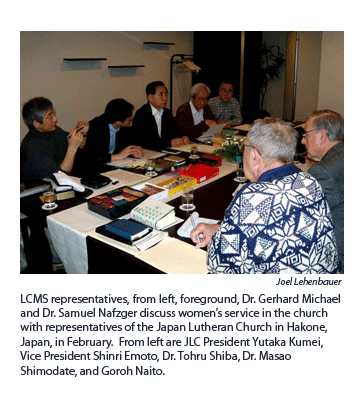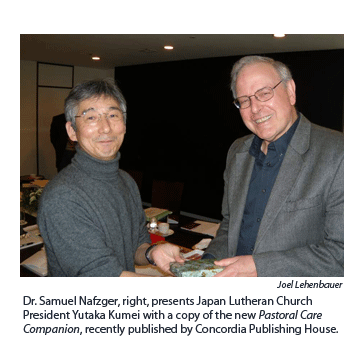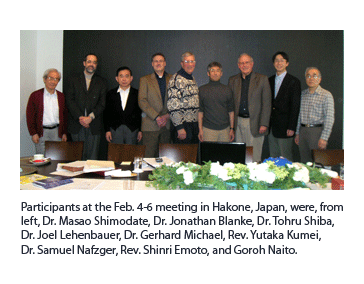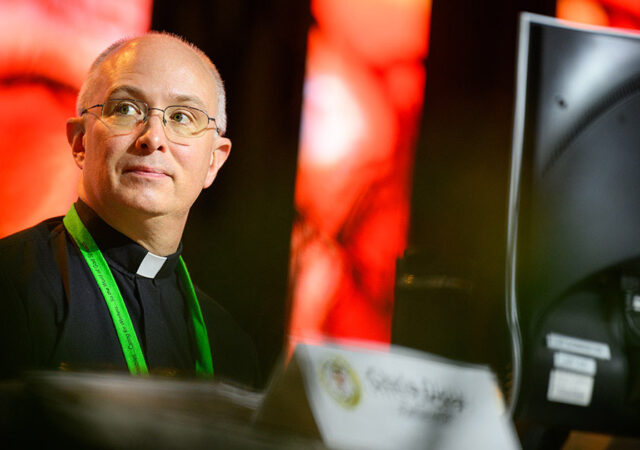The first of three meetings between representatives of the LCMS and the Japan Lutheran Church (JLC) to discuss “The Service of Women and th e Church” have “gotten off to a good start,” according to Dr. Samuel Nafzger, LCMS director of church relations — assistant to the president.
e Church” have “gotten off to a good start,” according to Dr. Samuel Nafzger, LCMS director of church relations — assistant to the president.
“All participants expressed thankfulness to God for the partnership in the Gospel which our churches have enjoyed for so many years,” said Nafzger, coordinator of the discussions for the LCMS. The first meeting was held Feb. 4-6 in Hakone, Japan.
The talks are taking place as a result of action taken by the JLC at its 14th General Convention in May 2008. A proposal was presented to the convention asking the JLC to begin ordaining women into the pastoral office. In response, the convention adopted a resolution calling for discussions with the LCMS before making a decision on the proposal.
LCMS President Gerald B. Kieschnick learned of the proposal prior to the JLC convention and expressed the willingness of the LCMS to discuss this issue with its Japan partner.
In his April 18, 2008, letter to JLC President Kimio Takano, Kieschnick said, “Today I am sending you this letter to express my sincere hope that your church might be willing to refrain from acting on this matter at this convention. As I am sure you are aware, a decision to ordain women into the pastoral office by the Japan Lutheran Church at this convention would have serious implications for the relationships which our two church bodies have enjoyed f or so many years. It is my fervent prayer that before making such a momentous decision, it would be possible for mutual discussions to take place between representatives of the Japan Lutheran Church and the LCMS regarding this matter.”
or so many years. It is my fervent prayer that before making such a momentous decision, it would be possible for mutual discussions to take place between representatives of the Japan Lutheran Church and the LCMS regarding this matter.”
The JLC was organized as an autonomous church in 1968, following the initiation of LCMS mission work in Japan in 1948. The Japan church body became an LCMS partner church in 1976.
In his letter of invitation formally requesting talks with the LCMS, newly elected JLC President Yutaka Kumei wrote to Kieschnick that the congregation that had presented the resolution to ordain women did not want it to have “a negative effect” on the JLC’s relationship with the LCMS.
“We strongly want to respect each other and maintain friendship (with the LCMS) more than ever,” Kumei wrote, adding that the JLC wanted to discuss the issue with the Synod “earnestly and fully.”
In the first round of talks, each church body gave presentations on “the history, the position, and the situation of the service of women” in their respective churches, according to Nafzger, and “extensive discussion” followed.
Much of the meeting was spent “listening to the other present its position on the service of women and the church as taught in Holy Scripture in the light of its contemporary situation,” Nafzger told Reporter.
Representing the JLC, in addition to Kumei, were Vice President R ev. Shinri Emoto; Rev. Jun Yamato, director of the seminary program and mission secretary; Dr. Tohru Shiba, chairman of the Theological Education Committee; Dr. Masao Shimodate, former director of the seminary program; and Goroh Naito, general secretary of the JLC.
ev. Shinri Emoto; Rev. Jun Yamato, director of the seminary program and mission secretary; Dr. Tohru Shiba, chairman of the Theological Education Committee; Dr. Masao Shimodate, former director of the seminary program; and Goroh Naito, general secretary of the JLC.
Besides Nafzger, LCMS representatives were Dr. Joel Lehenbauer, executive director of the Commission on Theology and Church Relations (CTCR), and Dr. Gerhard Michael, president of the Florida-Georgia District, a member of the CTCR, and a former missionary to Japan. Dr. Jonathan Blanke, associate professor in the Department of Religious Studies at Japan Lutheran College, served as devotion leader and translator.
The next round of discussions is planned for Sept. 8-10 in St. Louis. The JLC will expect to address the original proposal to ordain women during a special convention following the third round of discussions with the LCMS in early 2010.
Posted March 4, 2009





